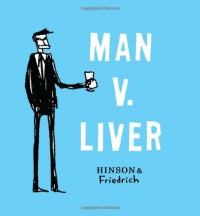Currently reading
Doubt: A History: The Great Doubters and Their Legacy of Innovation from Socrates and Jesus to Thomas Jefferson and Emily Dickinson
Philosophical Tales: Being an Alternative History Revealing the Characters, the Plots, and the Hidden Scenes That Make Up the True Story of Philosophy
How to Be a Woman
No Kidding: Women Writers on Bypassing Parenthood
Schottenfreude: German Words for the Human Condition
The Best American Short Plays 2010-2011
The Sagan Diary
 Gained almost nothing as far as plot in this series. However it was incredibly poetic and a nice introspective study.
Gained almost nothing as far as plot in this series. However it was incredibly poetic and a nice introspective study.
NOS4A2
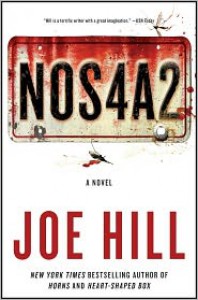 This was solidly OK. First off, or is clearly a product of Stephen King in one way or another; the simplistic language used to convey severity, the obsession with the innocence of children, nostalgia taken to a supernatural extreme. It's all here. That said this was placed better than any King I have read. So I suppose it's an improvement in the school of. I was never bored with it though it did become predictable. Like I said, solidly OK.
This was solidly OK. First off, or is clearly a product of Stephen King in one way or another; the simplistic language used to convey severity, the obsession with the innocence of children, nostalgia taken to a supernatural extreme. It's all here. That said this was placed better than any King I have read. So I suppose it's an improvement in the school of. I was never bored with it though it did become predictable. Like I said, solidly OK.
A Case of Conscience
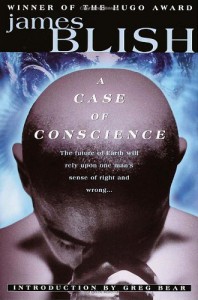 I loved the first half of this book. The second half I found unreadable. I have since heard that the first half is essentially the original novella and the second half was added later to bump it to a novel. This makes sense as the style and quality is wildly different.
I loved the first half of this book. The second half I found unreadable. I have since heard that the first half is essentially the original novella and the second half was added later to bump it to a novel. This makes sense as the style and quality is wildly different.
11/22/63
 I've recently read a string of mediocre novels and put out a call for something to really enjoy. I was recommended 11/22/63 bu Stephen King. I approached it with apprehension. There are a number of things about this book that would have stopped me from picking it up on my own. It's historical fic... more...
I've recently read a string of mediocre novels and put out a call for something to really enjoy. I was recommended 11/22/63 bu Stephen King. I approached it with apprehension. There are a number of things about this book that would have stopped me from picking it up on my own. It's historical fic... more...
Delirium
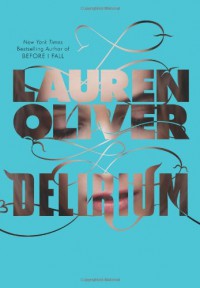 It was good enough. There are so many things about the world that could have been expanded on: the political history, the importance and institutionalization of religion, the goverment's hand in daily life. Instead all that is served up is a thin layer of world building; just enough to hold up th... more...
It was good enough. There are so many things about the world that could have been expanded on: the political history, the importance and institutionalization of religion, the goverment's hand in daily life. Instead all that is served up is a thin layer of world building; just enough to hold up th... more...
Dead Reckoning (Sookie Stackhouse, #11)
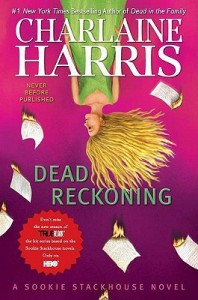 It was nice to get back to these characters after a long break, what with the last book being about a year old and the show on extended hiatus. I found that there was enough plot in here to sustain the first half of a book. Sookie isn't the most engaging heroin now that her world overpowers her e... more...
It was nice to get back to these characters after a long break, what with the last book being about a year old and the show on extended hiatus. I found that there was enough plot in here to sustain the first half of a book. Sookie isn't the most engaging heroin now that her world overpowers her e... more...
The Greatest Show on Earth: The Evidence for Evolution
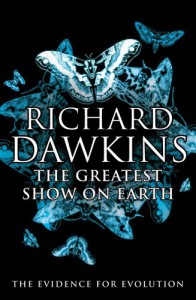 I liked this book well enough but it was a bit of a disappointment. Let me clarify: I was hoping for something a bit more in depth in terms of the actual process of evolution. To be fair I do have a background in evolution and ecology. However, I did figure that since he was writing an entire book on evolution that it would delve deeper than his text actually does.What is in the book is great. The examples really illustrate all the points he makes and one of his big arguments, that I feel he does back up, is that fossil records are a nice reference for evolution but are by no means the strongest evidence humans have for it.While he does state early on that this is a purely evolution oriented book and will not touch on the topic of belief he does directly address the problem of creationists, which he refers to as 'history deniers'. This, of course, very nearly becomes a debate about belief many times. Dawkins does do a good job at steering it back to evolution not by avoiding topics but by addressing what we do know rather than what we can't know.This is a good book for lay people to learn about what evolution and natural selection (it is NOT "survival of this fittest", it is much richer than that). It's a good book for people pretty familiar with evolution to bone up on examples. It's not that great for people with a background in the subject looking for a deep analysis of natural selection. For the last group this is mostly going to be a refresher of what you already know.
I liked this book well enough but it was a bit of a disappointment. Let me clarify: I was hoping for something a bit more in depth in terms of the actual process of evolution. To be fair I do have a background in evolution and ecology. However, I did figure that since he was writing an entire book on evolution that it would delve deeper than his text actually does.What is in the book is great. The examples really illustrate all the points he makes and one of his big arguments, that I feel he does back up, is that fossil records are a nice reference for evolution but are by no means the strongest evidence humans have for it.While he does state early on that this is a purely evolution oriented book and will not touch on the topic of belief he does directly address the problem of creationists, which he refers to as 'history deniers'. This, of course, very nearly becomes a debate about belief many times. Dawkins does do a good job at steering it back to evolution not by avoiding topics but by addressing what we do know rather than what we can't know.This is a good book for lay people to learn about what evolution and natural selection (it is NOT "survival of this fittest", it is much richer than that). It's a good book for people pretty familiar with evolution to bone up on examples. It's not that great for people with a background in the subject looking for a deep analysis of natural selection. For the last group this is mostly going to be a refresher of what you already know.
Janus: The Foundling War Book I: 1
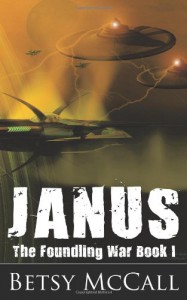 I don't usually go in for military sci-fi so please excuse me if I am unfamiliar with its tropes.This book follows the military career of Bah'dur Das, a brilliant young boy enrolled in a military academy of sorts. He is incredibly bright and the narrative jumps back and forth between his time in service and his time at school.The first thing that struck me is that the main character is set up to be incredibly smart; intelligent to the point of alienation. This can be a dangerous character trait to write as it openly invites the ego of the writer to emerge. I was very pleasantly surprised with the humanity that Das is written with. He is separated by his mind and suffers for it. This childhood treatment is the real core of the story, slowly exposed as the narrative weaves in and out of the war he grows up to fight.This was a solid lead with only a few slow parts. The battle scenes are a bit wordy but I assume that comes with the territory of military fiction. Bah'dur's arc is more than enough to pull the reader through the slower passages. The only part that I wasn't satisfied with was the ending which just sort of wanders off. I will give that a partial pass as this is a common issue in science fiction and also because this is the first book in a series. I will be picking up the next installment.
I don't usually go in for military sci-fi so please excuse me if I am unfamiliar with its tropes.This book follows the military career of Bah'dur Das, a brilliant young boy enrolled in a military academy of sorts. He is incredibly bright and the narrative jumps back and forth between his time in service and his time at school.The first thing that struck me is that the main character is set up to be incredibly smart; intelligent to the point of alienation. This can be a dangerous character trait to write as it openly invites the ego of the writer to emerge. I was very pleasantly surprised with the humanity that Das is written with. He is separated by his mind and suffers for it. This childhood treatment is the real core of the story, slowly exposed as the narrative weaves in and out of the war he grows up to fight.This was a solid lead with only a few slow parts. The battle scenes are a bit wordy but I assume that comes with the territory of military fiction. Bah'dur's arc is more than enough to pull the reader through the slower passages. The only part that I wasn't satisfied with was the ending which just sort of wanders off. I will give that a partial pass as this is a common issue in science fiction and also because this is the first book in a series. I will be picking up the next installment.
God Is Not Great: How Religion Poisons Everything
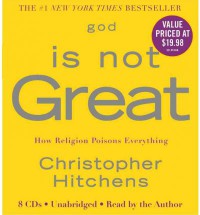 With a middle of the road rating I think it's fair to say this book is not great. Not bad but not great.While I felt that Hitchens' tone was polite the chapters did seem to repeat themselves. Where the book shone was with specific examples of religions not getting it right. The specifics in the history were new to me. It wasn't someone feeding me opinions I've already heard and sometimes share. It was Hitchens providing new information, and concrete examples to punctuate his points. I would have loved a book by him that was more history lesson and less preaching. It's science and fact that he's so fond of. Focus on that.Other than that rather large hang-up I found the book enjoyable. The author comes across as genuinely well read and well informed. And with something that is essentially a large op-ed that's a pretty big plus.
With a middle of the road rating I think it's fair to say this book is not great. Not bad but not great.While I felt that Hitchens' tone was polite the chapters did seem to repeat themselves. Where the book shone was with specific examples of religions not getting it right. The specifics in the history were new to me. It wasn't someone feeding me opinions I've already heard and sometimes share. It was Hitchens providing new information, and concrete examples to punctuate his points. I would have loved a book by him that was more history lesson and less preaching. It's science and fact that he's so fond of. Focus on that.Other than that rather large hang-up I found the book enjoyable. The author comes across as genuinely well read and well informed. And with something that is essentially a large op-ed that's a pretty big plus.
Edenborn
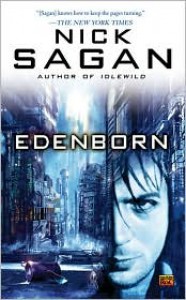 While the narrative was not as easy to get into as Idlewild (the first in the series) I did find it a much better read. Idlewild was a nice, small story while Edenborn is on its way to growing into the world Nick Sagan has created. I say on it way because it's still not there yet. While there is a plenty of travel from continent to continent it still was a small family drama at the core of the book. These incredible minds are supposed to be fixing the world and instead seem more interested in petty behavior and working on smaller side experiments.I did enjoy this book. It took me a bit to get into but was worth it. I am, however, hoping for more out of the next book, Everfree than the series has delivered so far.
While the narrative was not as easy to get into as Idlewild (the first in the series) I did find it a much better read. Idlewild was a nice, small story while Edenborn is on its way to growing into the world Nick Sagan has created. I say on it way because it's still not there yet. While there is a plenty of travel from continent to continent it still was a small family drama at the core of the book. These incredible minds are supposed to be fixing the world and instead seem more interested in petty behavior and working on smaller side experiments.I did enjoy this book. It took me a bit to get into but was worth it. I am, however, hoping for more out of the next book, Everfree than the series has delivered so far.
Storm Front (Dresden Files Series #1)
 Tepid is the best way to describe my feelings after finishing this book. It wasn't bad. It wasn't all that good either.Harry Dresden comes off as an homage (or rip off) of classic noir detectives rather than following in his footsteps. There's the bad taste of wish fulfillment in the fact that he's grumpy and unkempt while still being chivalrous and romantic at heart.As for his actually detective skills... they are more than a little lacking. He never actually makes a break in his own case. Instead he relies on the "wait-and-see" method where he reacts to a situation, broods for a while and then has someone tell him everything he needs to know in one big data dump.As an homage it's thin but passable. As an original story it leaves me wanting a better detective and details about the magic world Harry only hints at as part of his past. There might be a great, entertaining story in the world that Harry Dresden lives in but this certainly isn't it.
Tepid is the best way to describe my feelings after finishing this book. It wasn't bad. It wasn't all that good either.Harry Dresden comes off as an homage (or rip off) of classic noir detectives rather than following in his footsteps. There's the bad taste of wish fulfillment in the fact that he's grumpy and unkempt while still being chivalrous and romantic at heart.As for his actually detective skills... they are more than a little lacking. He never actually makes a break in his own case. Instead he relies on the "wait-and-see" method where he reacts to a situation, broods for a while and then has someone tell him everything he needs to know in one big data dump.As an homage it's thin but passable. As an original story it leaves me wanting a better detective and details about the magic world Harry only hints at as part of his past. There might be a great, entertaining story in the world that Harry Dresden lives in but this certainly isn't it.
Make Room! Make Room!
 Overall a good, solid read. This book suffers the most from what I've seen in other Harry Harrison novels; namely that he gets people spot on but is way off with future prediction. In the Stainless Steel Rat books he has punchcards on spaceship computers. In this book he has birth control completely abolished in all forms. Granted, they way it's talked about in the book is very close to how we discuss abortion, but that would be reading in a false metaphor to switch the thesis like that.Other than the cause of the future strife this is a solid read. While it really is more of a "slice of life" than a mystery it moves along at a pretty good clip and there are diverse enough characters that you can really get a feel for the world Harrison has created.
Overall a good, solid read. This book suffers the most from what I've seen in other Harry Harrison novels; namely that he gets people spot on but is way off with future prediction. In the Stainless Steel Rat books he has punchcards on spaceship computers. In this book he has birth control completely abolished in all forms. Granted, they way it's talked about in the book is very close to how we discuss abortion, but that would be reading in a false metaphor to switch the thesis like that.Other than the cause of the future strife this is a solid read. While it really is more of a "slice of life" than a mystery it moves along at a pretty good clip and there are diverse enough characters that you can really get a feel for the world Harrison has created.
FlashForward
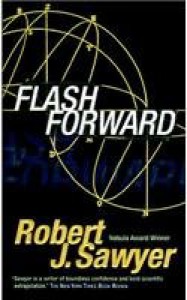 This book was OK but not nearly what I was expecting. Between the fact that it's the basis for the upcoming Lost replacement show on ABC and what people have said to me about it I was expecting a large scale novel about global events.In fact, this book is incredibly small scale. It's focus rarely extends outside of 3 of the scientists working at the collider. It does a well enough job rounding them out but the novel constantly suffers from having such a narrow scope. We hear mention of global or at least international initiatives to collect these visions together but nothing ever comes of it. One would think that if there was a free and open database with specifics about the future a few decades hence it would have a huge impact on politics, technology, social trends... Apparently it does not.So the book just feels OK. It's not bad. I wanted more about everyone mentioned as well as wanting more people mentioned. And that held this novel back from having any sort of real impact.
This book was OK but not nearly what I was expecting. Between the fact that it's the basis for the upcoming Lost replacement show on ABC and what people have said to me about it I was expecting a large scale novel about global events.In fact, this book is incredibly small scale. It's focus rarely extends outside of 3 of the scientists working at the collider. It does a well enough job rounding them out but the novel constantly suffers from having such a narrow scope. We hear mention of global or at least international initiatives to collect these visions together but nothing ever comes of it. One would think that if there was a free and open database with specifics about the future a few decades hence it would have a huge impact on politics, technology, social trends... Apparently it does not.So the book just feels OK. It's not bad. I wanted more about everyone mentioned as well as wanting more people mentioned. And that held this novel back from having any sort of real impact.
Bones of the Moon
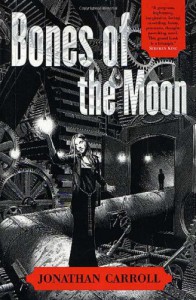 Probably my least favourite Jonathan Carroll novel to date. I will admit that I almost always take issue with his deus ex machina ending. However, that was the least of my complaints for Bones of the Moon. The fantasy element was thinned out to be almost non-existent until the last few pages. Oddly enough, this ending was probably his most earned since no one steps in from out of nowhere to save the day that hasn't been built up. It is his least fulfilling ending, though. It feels rushed and not earned in the least.I also found most of the characters other than Cullen and Eliot to be 2 dimensional at best, throw away at worst. In the 2 dimensional category falls Weber and Pepsi. They don't develop or expand as the story progresses. They just trudge through the plot and react, never learning.In the throw away corner is Danny James. He seems put there to be perfect and supportive but then 2/3 of the way through the book vanishes completely. He had no function other than to be furniture in Cullen's perfect home life.I usually Read Carroll's novels not for the plot (as I mentioned, his endings never fail to fell pointless) but to watch interesting characters be put through extraordinary situations. Bones of the Moon lacked both interesting characters as well as extraordinary situations.
Probably my least favourite Jonathan Carroll novel to date. I will admit that I almost always take issue with his deus ex machina ending. However, that was the least of my complaints for Bones of the Moon. The fantasy element was thinned out to be almost non-existent until the last few pages. Oddly enough, this ending was probably his most earned since no one steps in from out of nowhere to save the day that hasn't been built up. It is his least fulfilling ending, though. It feels rushed and not earned in the least.I also found most of the characters other than Cullen and Eliot to be 2 dimensional at best, throw away at worst. In the 2 dimensional category falls Weber and Pepsi. They don't develop or expand as the story progresses. They just trudge through the plot and react, never learning.In the throw away corner is Danny James. He seems put there to be perfect and supportive but then 2/3 of the way through the book vanishes completely. He had no function other than to be furniture in Cullen's perfect home life.I usually Read Carroll's novels not for the plot (as I mentioned, his endings never fail to fell pointless) but to watch interesting characters be put through extraordinary situations. Bones of the Moon lacked both interesting characters as well as extraordinary situations.
Eifelheim
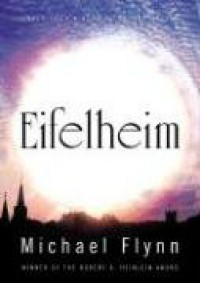 I'd say that 3 stars if a fair rating for this book. First of all, it's almost like 2 separate stories. There's the historical narrative and the present day narrative.The historical is by far the stronger story and that makes this book lopsided. The medieval town is fully fleshed out and holds most of the book quite well.And that makes the present narrative all the more awkward. In terms of page count there is much less in the present. I don't know if it's the cause or effect of the two contemporary researchers having very little character but they come across as flat. With so little page time all they do is deliver lectures about their fields of study (history and physics). I would have loved for them to be less like a set of tools and more like the historical people who's plot wanders around their daily lives.Like most split narratives the stories come together towards the end of the novel. It wasn't until the last section that I realized the present narrative was really a detective story and should have been paced and plotted like one all along.Overall I'd say that this book is worth reading but still flawed.
I'd say that 3 stars if a fair rating for this book. First of all, it's almost like 2 separate stories. There's the historical narrative and the present day narrative.The historical is by far the stronger story and that makes this book lopsided. The medieval town is fully fleshed out and holds most of the book quite well.And that makes the present narrative all the more awkward. In terms of page count there is much less in the present. I don't know if it's the cause or effect of the two contemporary researchers having very little character but they come across as flat. With so little page time all they do is deliver lectures about their fields of study (history and physics). I would have loved for them to be less like a set of tools and more like the historical people who's plot wanders around their daily lives.Like most split narratives the stories come together towards the end of the novel. It wasn't until the last section that I realized the present narrative was really a detective story and should have been paced and plotted like one all along.Overall I'd say that this book is worth reading but still flawed.









